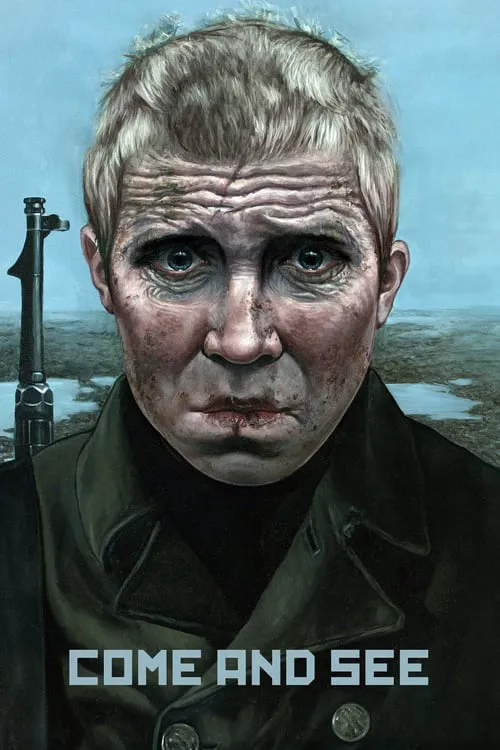炎628

あらすじ
第二次世界大戦中の風光明媚でありながらも多難なベラルーシ地方では、12歳のフロリアが緑豊かな森と丘陵に囲まれた小さな村に住んでいる。幼い少年にとって平和な生活は、戦争のあらゆる場所に浸透する恐怖によってすぐに打ち砕かれる。家族がフロリアに森の疲弊した抵抗勢力に加わるべきだと決めたとき、フロリアののどかな日々は永遠に変わる。フロリアは最初、親としての義務に縛られているが、残忍な戦争で自分の若い命を危険にさらす価値を見出せない。フロリアが安全を求めて森を駆けずり回るのは、容赦ないドイツ軍による村の組織的な破壊を目の当たりにした後のことである。 旅の途中、フロリアはグラシャという仲間の生存者に出会う。幼い少女は、残虐行為を直接目撃し、年齢に囚われない無邪気さを持っている。少女の視点はフロリアの視点を研ぎ澄まし、侵略者に対する必死の戦いに参加するという決意を強める。二人は荒廃した風景の中を、不確実さを頼りに進んでいく。二人の旅は紛争と絶望の中で人間の存在の脆弱性について疑問を投げかけ、忘れられない印象を残す。こうして、フロリアの村は戦前の希望と若さの象徴となる。しかしその後、打ち砕かれた生活が残される。 心配した家族の強い主張でフロリアは村に戻るが、故郷にどんな運命が待ち受けているか知らない。到着する前に、彼の村は陥落している。フロリアが村につまずき、打ちのめされる瞬間は痛ましい。かつて神聖だった場所は、ことごとく破壊されている。残っているのは死のような静寂だけだ。 彼の人生を過酷なサバイバルの道へと導いた重要な決断こそ、真髄の始まりである。シーンは孤立と恐怖へと移行し、それが多くの人を破壊の道へと突き動かし、彼らの状態はかつて知っていたすべてのものから切り離されていく。若き主人公たちの回復力と決意を試す過酷な旅であり、あらゆる期待に打ち勝ち、完全に打ち砕く行為である。 何ヶ月もの間、フロリアは現実を理解しようと苦闘する。まるで麻痺したように、絶望が容赦ない重圧の下で彼を捉えていることを認識し理解するには時間がかかる。飢餓、恐怖、そして失われたという絶え間ない認識が、彼を不快な一線を越えさせる。フロリアは、日々が夜に変わり、正義への希望が必死の時に揺らぐ中、激しい苦難に直面する。溺れる人が板に掴まるように、グラシャにしっかりと縋りつくことに慰めを見出す。快適さのない背景の中で、自分たちだけで身を守ることが彼の知るすべてなのだ。 一連の残忍で忘れられない体験は、彼の中に残された強さを試す。戦争はフロリアの脆弱な精神に消えない傷跡を焼き付け、決して修復できない壊れない亀裂を残す。これらの試練を通して、フロリアの中の虚弱な子供はあらゆる一歩で破壊に抵抗する。弱まることのない回復力で、彼はそれぞれの打撃に耐え、自分の脆弱な魂はこの過酷で非人道的なサイクルを生き残らなければならないと確信している。 運命は安易な脱出を許さず、この子供にすべてを襲い掛かってくるようだ。フロリアにとって人生はますます危険になり、自分自身を救うためには、それに向き合って強くならなければならない。この領域では無実さえも汚され、被験者は破壊に逆らうために、大切にしていた心と魂を犠牲にすることを余儀なくされる。グラシャの存在は、暗く打ち砕かれる瞬間における彼の導きの光となる。自分自身のため、そして彼女のために。
レビュー
Waylon
A poem of death, an apocalyptic vision, shrapnel blooms searing through the heart. Nazi demons leave no remains, yet spring returns in dreams. This is hell, come and see for yourself.
Jude
The most brutal film in cinematic history—just watch it. It's a pity I've never appreciated filmmakers who inject their own emotions into a film. But setting aside the political and ideological elements, the portrayal of humanity during wartime remains deeply affecting. ★★★★
August
Not just an underrated gem, but an underrated masterpiece. The sound and visuals, which communicate the suffering soul and dark history, blur the lines between expressionism and realism. The overwhelming and powerful audiovisual experience completely drags the viewer into another space-time that once truly existed. All the words that describe the cruelty of war pale in comparison and become mere embellishments. It's been a very, very long time since I've seen a movie that made me feel so insignificant after the credits rolled. → 20.12.4 Revisited at the film archive after three years. A confirmation. Let go of superficial authority.
Taylor
A lot of people walked out midway through the film, some fell asleep, their snores echoing through the theater. After the credits rolled, a girl who had been glued to her phone in the front half of the rows finally looked up, declaring the film "misery porn" before laughing with her friend. In that moment, I felt that people are indeed too well-fed these days, shouldn't there be some basic empathy and respect as a human being? No piece of history deserves to be evaluated like that. Admittedly, the film has pacing issues, and the viewing experience can be quite disturbing, but even if it is "exploitative," I believe the director, the crew, and even the people in that entire period of WWII history, didn't expect you to cheapen their experiences with the cost of a movie ticket...
Alice
The ideological inflexibility is too obvious. The so-called "most brutal truth of war" is actually filled with subjective, "gritted-teeth hatred," leading to a complete loss of control in the end. It's acceptable as propaganda, but its artistic presentation and aesthetic qualities relegate it to second-rate status.
おすすめ




